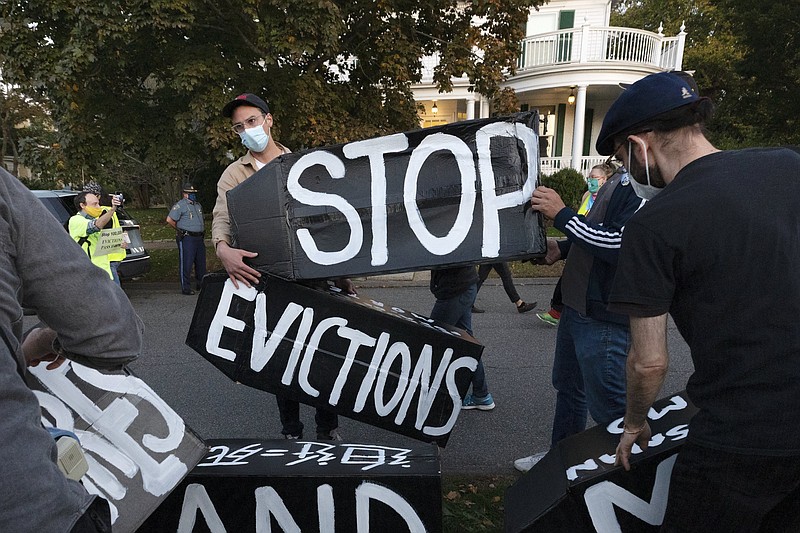Follow the money - if you can. But make no mistake, the trail is winding across 50 states, some territories, the District of Columbia and into not an insignificant number of larger cities and metro counties.
The money isn't insignificant either: nearly $47 billion allocated by Congress for emergency pandemic rental assistance before an off-again, on-again federal eviction moratorium briefly ended July 31.
If the money isn't quickly put to its intended use - to help people stay in their homes after they lost work thanks to the economic upsets of COVID-19 - some 3.4 million to 7 million people will be at risk of losing their homes.
That $47 billion, an historic amount of money larger than the Department of Housing and Urban Development's annual budget, was allocated in December and March, first from the CARES Act and later from the American Rescue Plan.
Now it's early August and millions of people, unemployed or barely employed through no fault of their own, have run through their savings and watched their rental or mortgage bills mount while federal and state bureaucracies frittered away time with applications that took as long as three hours just to fill out.
As of May 31, less than 4% of the money had been allotted, according to the Treasury Department - $1.5 billion had been provided to about 350,000 households.
There's plenty of blame to go around. Housing advocates point to the slow December and January rollout under Trump's Treasury Department, which took weeks to vaguely explain how the money could be spent.
Under the Biden administration, the criteria was made clearer, but it also produced a burdensome process seemingly more focused on preventing fraud than helping renters.
Advocates said states made things worse - some waiting months to set up programs with still more bureaucratic hurdles.
Now here we are careening toward the end of summer with COVID-19 cases surging again. The U.S. Census Bureau's Household Pulse Survey indicates at least 3.4 million people could face eviction in the next two months. Housing advocates say the number could be twice that. For context, that would be nearly the equivalent of every man, woman and child in the state of Tennessee suddenly out on the street with nowhere to call home.
But back to following the money, starting with Tennessee.
The Tennessee Housing Development Agency said it received $384 million in the first-round of federal COVID relief early this year to be used for rental assistance to help an estimated 25,000 to 30,000 families cover up to 12 months of rent or utility payments.
THDA spokesman Wes Bunch said that as of Aug. 1, Tennessee had paid out $14.7 million to help 2,257 people in 91 of Tennessee's 95 counties - a dispersal of about 3.8% of the money.
We also asked THDA: Where was the money dispersed: In what cities and counties? Is the unused money held in state coffers? Which ones? Does it earn interest? How much? And does that interest accrue to the state or go back into the program?
We don't know the answers to those questions yet.
We do know that attorneys representing distressed renters say relief has been difficult to obtain - in part due to qualification requirements and red tape, and in part due to landlords refusing to participate in the rent-relief process.
Why would landlords refuse to be paid? Consider our red-hot housing market:
Over the past year, Tennessee's most populated cities saw some of the highest rent increases in the country. Chattanooga's residential rental rates rose nearly twice as fast as the national average, and Memphis rents jumped by more than 23%. If you were a landlord, would you want to settle for last year's rent when you can evict late payers and be well-assured of getting new renters for more money?
Here's how the money trail looks elsewhere:
* The National Low Income Housing Coalition found that of the 51 programs it has tracked so far, just 14% of funds allocated in December had been distributed. (Most states aren't yet distributing the March money for both renters and homeowners late on their mortgages from the second round of COVID relief.)
* The Associated Press found that Georgia has distributed only $14 million of its $552 million.
* The AP also found: North Dakota provided $3.4 million of $200 million, North Carolina awarded $73 million out of $546 million, California distributed $73 million of its $1.4 billion and West Virginia handed out only $8.7 million in its first-round $200 million. New York launched a $2 billion program last month, but expects it will be four to six weeks before it distributes anything. ANYTHING.
The common excuse, according to AP, was that federal requirements are too onerous and the guidelines too stringent.
"It's labor intensive," said one West Virginia bureaucrat, describing requirements to verify a COVID-19 hardship and documenting an applicant's income before going to a landlord for acceptance of the funds."It's just not something that can happen overnight."
But getting evicted from your home is something that can happen overnight. And how labor intensive is it going to be to be, and expensive, to get 3.5 million or 7 million people back under roofs again?
In the last several decades we've managed to figure out how to streamline bailouts for banks, mortgage servicers and car companies. Surely we can now figure out how to quickly and more reasonably bail out our neighbors who've gotten behind on rent through no fault of their own.
